Global Point of Care



ALL ABOUT RSV
Respiratory syncytial virus (RSV) is a common respiratory virus. Most of the time, it causes mild, cold-like symptoms that can be easily confused with other respiratory illnesses. But there are cases that can be serious and lead to more severe illnesses. Your clinician can confirm RSV with a rapid molecular RSV test so you can have confidence in knowing your symptoms are caused by a virus that will usually run its course without treatment.
Find a test provider with ID NOW rapid molecular testing for more information.
RECOGNIZING RSV SYMPTOMS
RSV usually causes mild, cold-like symptoms that appear in stages. In very young infants the only symptoms may be irritability, decreased activity and breathing difficulties.1
Common symptoms of RSV5,6
- Mild, cold-like symptoms in the nose, throat, and sinuses
- Fevers
- Chills
- Cough
- Sneezing
- Runny nose
- Decrease in appetite
- Wheezing
Experiencing symptoms?
Learn more about RSV symptoms and potential complications, as well as how rapid molecular tests can quickly identify the RSV virus so you can start the right treatment earlier and get well sooner.
RSV Facts
RSV is spread through coughing, sneezing or direct contact with infected people who are contagious (people are typically contagious for 3-8 days, infants and people with weakened immune systems can be contagious for up to 4 weeks)1
- Most children will have an RSV infection by the time they turn two years old1
- 1-2% of infants younger than 6 months may need to be hospitalized5,6
- Up to half of infants and young children with RSV will have an infection deeper into their airways5,6
- In the US, more than 177,000 adults aged 65 years or older are hospitalized because of RSV every year2
- For most adults, RSV is not common, but in certain adult populations, like the elderly, persons with cardiopulmonary disease or those who are immunocompromised, RSV can be serious10
DIAGNOSING RSV
Rapid molecular testing for RSV may be the best way to quickly diagnose your infection. The test can tell your clinician in minutes if it’s RSV, which can help reduce inappropriate antibiotic use, as the RSV virus should not be treated with antibiotics2 Once you have a RSV diagnosis, you can take the right precautions to avoid spreading RSV to your vulnerable loved ones.9
TREATING RSV SYMPTOMS
Most RSV infections will last 1-2 weeks and not require treatment; however, there are cases that can be more serious causing severe infections such as bronchiolitis and pneumonia, especially in young children. You should call your healthcare professional if your child has difficulty breathing, is not drinking enough fluids or symptoms worsen.5
EVERYDAY STEPS TO HELP PREVENT RSV
The best way to stop RSV from spreading is to:8
 | Cover coughs and sneezes with a tissue or upper shirt sleeve |
 | Wash hands often with soap and water for at least 20 seconds |
 | Avoid close contact with others, and parents should keep children with symptoms away from younger siblings who may be at a higher risk for severe RSV |
 | Clean frequently touched surfaces |


READ MORE ABOUT RAPID Testing

Sign up for Rapid Insights, our email series on rapid molecular testing
This program will teach you about rapid tests and how they can quickly identify illnesses like the flu, COVID-19, respiratory syncytial virus (RSV), and strep throat. Rapid testing can help you get treated earlier and get well sooner.

ALL ABOUT RESPIRATORY ILLNESSES
Learn about respiratory illnesses and the newer advanced test technology that offers fast and accurate results. Knowing now means you’ll be treated earlier which can help you get well sooner.

FIND THE BEST TEST FOR YOU
Rapid tests are essential tools to help diagnose what’s behind your symptoms, so you can treat earlier and get well sooner. Understand the differences between rapid molecular tests and at home COVID-19 antigen self tests.
REFERENCES
- Symptoms and Care.” Centers for Disease Control and Prevention (CDC). Last reviewed September 24, 2021. https://www.cdc.gov/rsv/about/symptoms.html.
- “RSV in Older Adults and Adults With Chronic Medical Conditions” Centers for Disease Control and Prevention (CDC). Last reviewed December 18, 2020. https://www.cdc.gov/rsv/high-risk/older-adults.html.
- “Respiratory Syncytial Virus Infection (RSV)” Centers for Disease Control and Prevention (CDC). Last reviewed December 18, 2020. https://www.cdc.gov/rsv/index.html.
- Azar, Marwan M,. Marie L. Landry. "Detection of Inluenza A and B Viruses and Respiratory Syncytial Virus by Use of Clinical Laboratory Improvement Amendements of 1988 (CLIA)-Waived Point-of-Care Assays: A Paradigm Shift to Molecular Tests." Journal of Clinical Microbiology 56, no. 7 (July 2018): e00367-18. https://doi.org.10.1128/JCM.00367-18.
- “RSV in Infants and Young Children” Centers for Disease Control and Prevention (CDC). Last reviewed December 18, 2020. https://www.cdc.gov/rsv/high-risk/infants-young-children.html
- Borchers, Andrea T., et al. "Respiratory Syncytial Virus - A Comprehensive Review." Clinical Reviews in Allergy & Immunology 45, no. 3 (December 2013): 331-379. https://doi.org/10.1007/S12016-013-8368-9
- Stivers, Tanya. "Managing Patient Pressure to Prescribe Antibiotics in the Clinic." Pediatric Drugs 23, no. 5 (September 2021): 437-443. https://doi.org/10.1007/S40272-021-00466-y.
- "RSV Prevention." Centers for Disease Control and Prevention (CDC). Last reviewed December 18, 2020. https://www.cdc.gov/rsv/about/prevention.html.
- Wabe, Nasir., et al. "The Impact of Rapid Molecular Diagnostic Testing for Respiratory Viruses on Outcomes for Emergency Department Patients." Medical Journal of Australia 210, no. 7 (April 2019): 316-320. https://doi.org/10.5694/mja2.50049.





